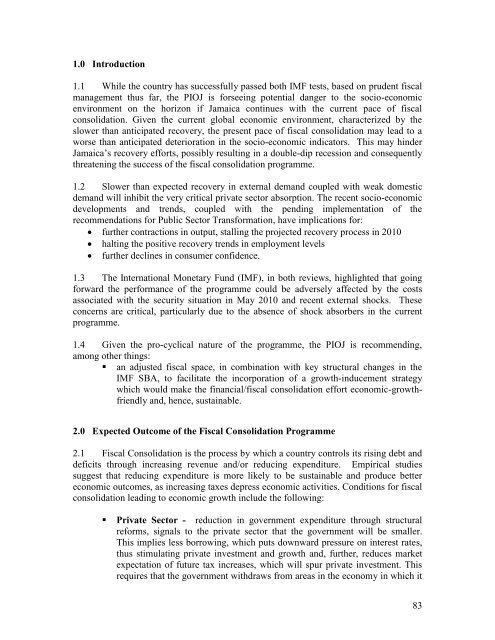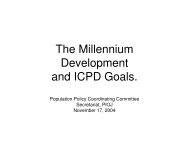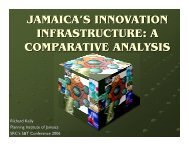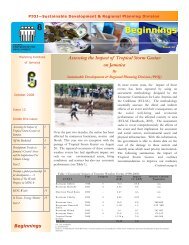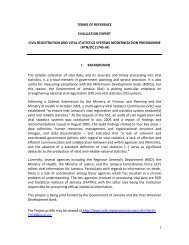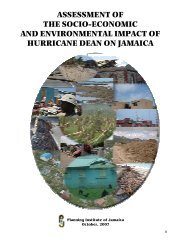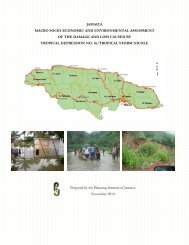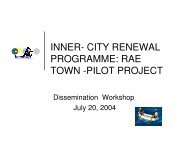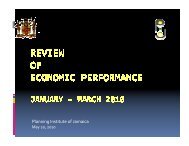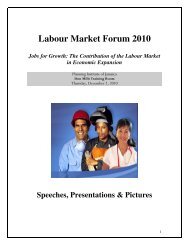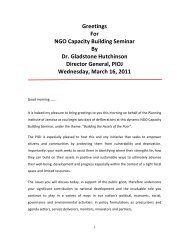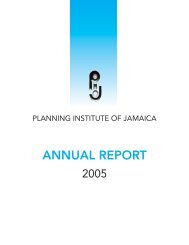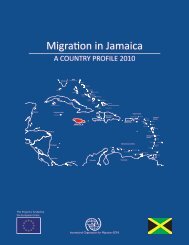PIOJ Growth-Inducement Strategy - Planning Institute of Jamaica
PIOJ Growth-Inducement Strategy - Planning Institute of Jamaica
PIOJ Growth-Inducement Strategy - Planning Institute of Jamaica
Create successful ePaper yourself
Turn your PDF publications into a flip-book with our unique Google optimized e-Paper software.
1.0 Introduction<br />
1.1 While the country has successfully passed both IMF tests, based on prudent fiscal<br />
management thus far, the <strong>PIOJ</strong> is forseeing potential danger to the socio-economic<br />
environment on the horizon if <strong>Jamaica</strong> continues with the current pace <strong>of</strong> fiscal<br />
consolidation. Given the current global economic environment, characterized by the<br />
slower than anticipated recovery, the present pace <strong>of</strong> fiscal consolidation may lead to a<br />
worse than anticipated deterioration in the socio-economic indicators. This may hinder<br />
<strong>Jamaica</strong>’s recovery efforts, possibly resulting in a double-dip recession and consequently<br />
threatening the success <strong>of</strong> the fiscal consolidation programme.<br />
1.2 Slower than expected recovery in external demand coupled with weak domestic<br />
demand will inhibit the very critical private sector absorption. The recent socio-economic<br />
developments and trends, coupled with the pending implementation <strong>of</strong> the<br />
recommendations for Public Sector Transformation, have implications for:<br />
further contractions in output, stalling the projected recovery process in 2010<br />
halting the positive recovery trends in employment levels<br />
further declines in consumer confidence.<br />
1.3 The International Monetary Fund (IMF), in both reviews, highlighted that going<br />
forward the performance <strong>of</strong> the programme could be adversely affected by the costs<br />
associated with the security situation in May 2010 and recent external shocks. These<br />
concerns are critical, particularly due to the absence <strong>of</strong> shock absorbers in the current<br />
programme.<br />
1.4 Given the pro-cyclical nature <strong>of</strong> the programme, the <strong>PIOJ</strong> is recommending,<br />
among other things:<br />
• an adjusted fiscal space, in combination with key structural changes in the<br />
IMF SBA, to facilitate the incorporation <strong>of</strong> a growth-inducement strategy<br />
which would make the financial/fiscal consolidation effort economic-growthfriendly<br />
and, hence, sustainable.<br />
2.0 Expected Outcome <strong>of</strong> the Fiscal Consolidation Programme<br />
2.1 Fiscal Consolidation is the process by which a country controls its rising debt and<br />
deficits through increasing revenue and/or reducing expenditure. Empirical studies<br />
suggest that reducing expenditure is more likely to be sustainable and produce better<br />
economic outcomes, as increasing taxes depress economic activities. Conditions for fiscal<br />
consolidation leading to economic growth include the following:<br />
• Private Sector - reduction in government expenditure through structural<br />
reforms, signals to the private sector that the government will be smaller.<br />
This implies less borrowing, which puts downward pressure on interest rates,<br />
thus stimulating private investment and growth and, further, reduces market<br />
expectation <strong>of</strong> future tax increases, which will spur private investment. This<br />
requires that the government withdraws from areas in the economy in which it<br />
83


